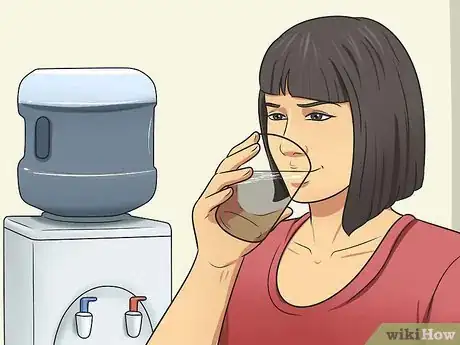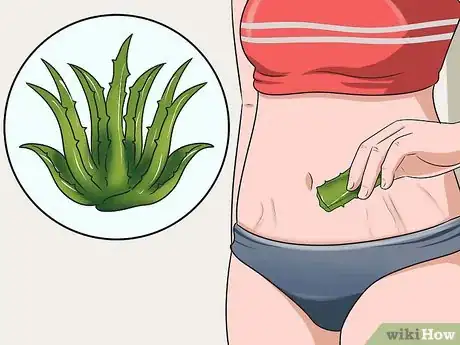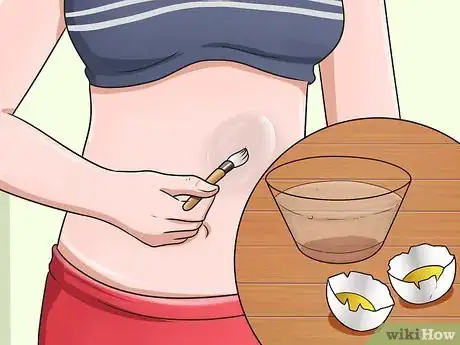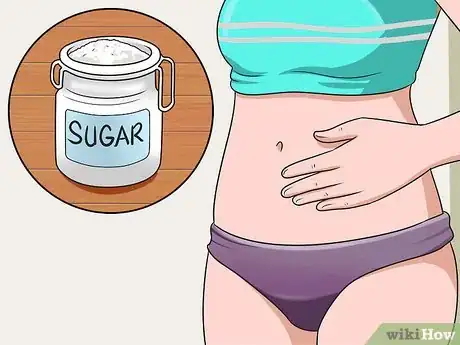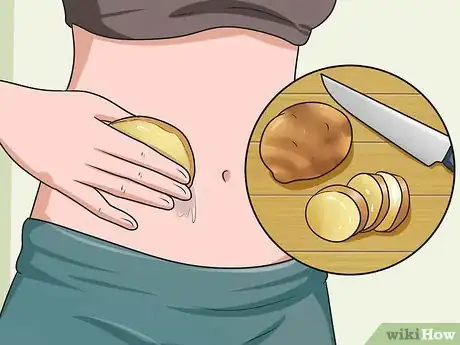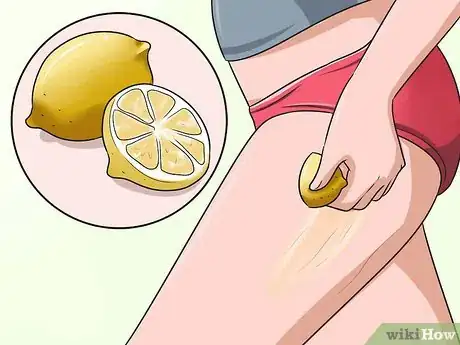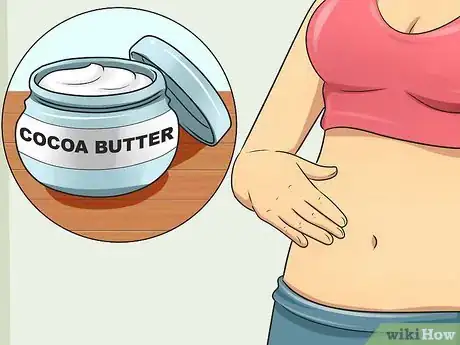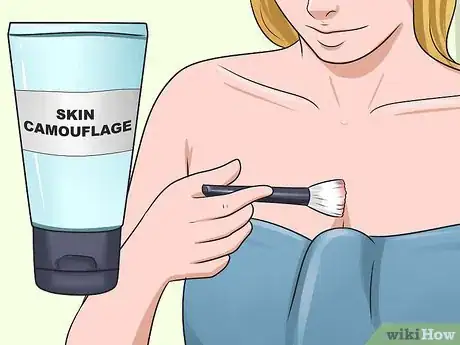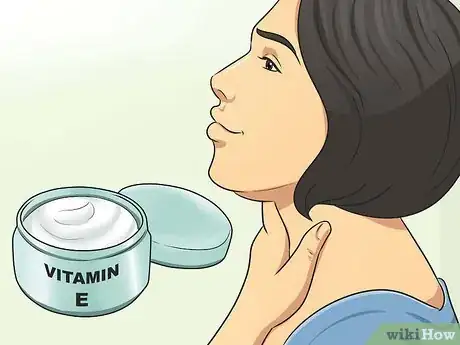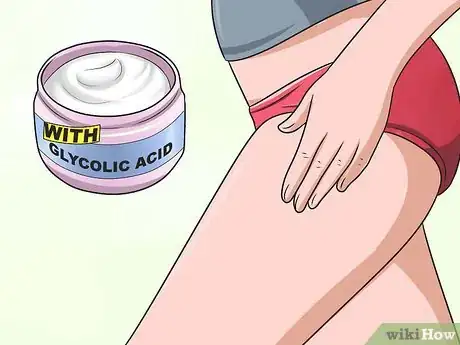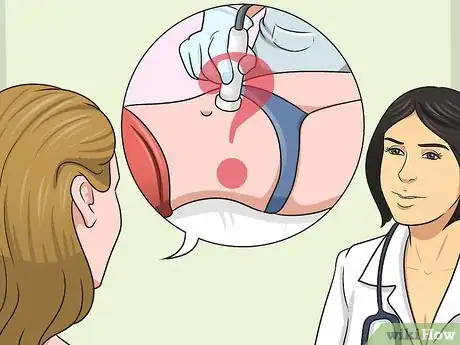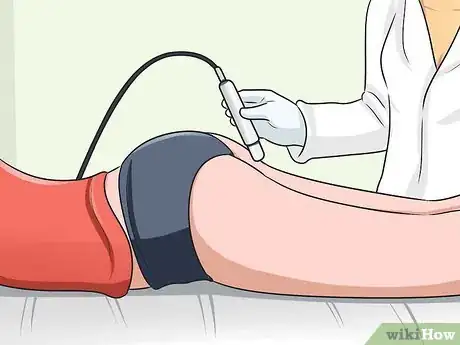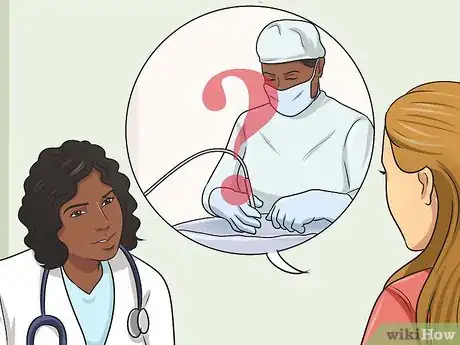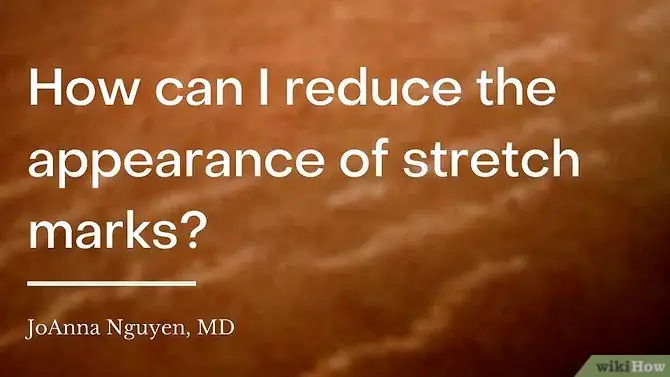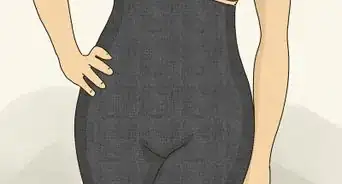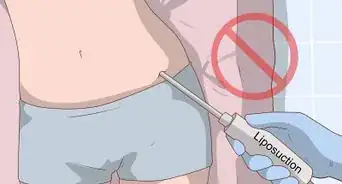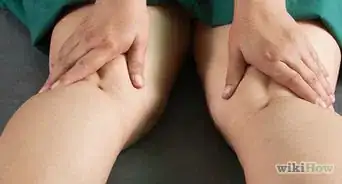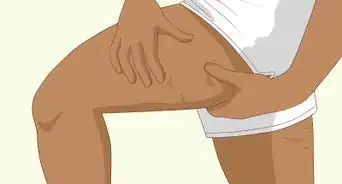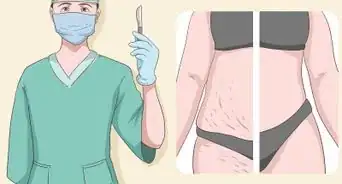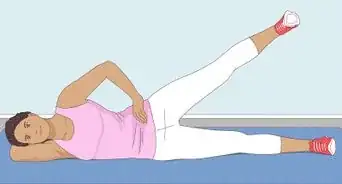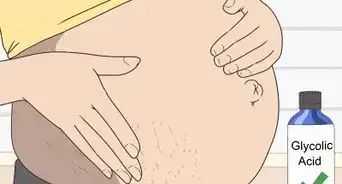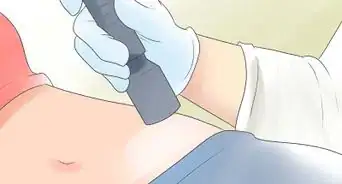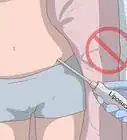This article was co-authored by Adarsh Vijay Mudgil, MD. Dr. Adarsh Vijay Mudgil is a board certified Dermatologist, Dermatopathologist, and the Owner of Mudgil Dermatology, a state-of-the-art dermatology practice based in New York, New York. As one of the few dermatologists in the area to achieve board certification in both dermatology and dermatopathology, Dr. Mudgil specializes in all aspects of medical, surgical, and cosmetic dermatology. He received his Bachelor's degree with Phi Beta Kappa honors from Emory University and earned his Doctor of Medicine (MD) with Alpha Omega Alpha honors from the Stony Brook University School of Medicine. In medical school, Dr. Mudgil was among a handful of students nationwide to receive a coveted Howard Hughes Medical Institute Fellowship and Scholarship. He then completed his residency in dermatology at the Mount Sinai Medical Center in Manhattan, where he served as chief resident. Additionally, Dr. Mudgil went on to complete a fellowship at the prestigious Ackerman Academy of Dermatopathology. He is a fellow of the American Academy of Dermatology, the American Society for Dermatologic Surgery, and the American Society of Dermatopathology. Dr. Mudgil is also a member of the Mount Sinai School of Medicine teaching faculty.
There are 8 references cited in this article, which can be found at the bottom of the page.
This article has been viewed 1,413,095 times.
Stretch marks, or striae, develop when your skin suddenly needs to stretch beyond the limits of its natural growth rate. The middle layer of your skin breaks in places, causing the lower layers of your skin to show through. "Active" stretch marks tend to be red or purple, fading toward silvery white over time, although colors will vary depending upon your skin tone.[1] Up to 90 percent of pregnant women develop stretch marks over the course of their pregnancies. Stretch marks may also develop when you hit a growth spurt as an adolescent, lose a lot of weight fast, or if you build muscle exceptionally quickly. Most medical professionals regard time as the best "treatment" for stretch marks. They will eventually fade and diminish in prominence. Active stretch marks may respond to a variety of treatments, but keep in mind that the effectiveness of any treatment may be limited.[2]
Steps
Pursuing Home Remedies
-
1Drink plenty of water. Water is the quickest and most efficient way to minimize the appearance of stretch marks. Properly hydrated skin is softer and more supple, causing your skin to appear more toned and eliminating some of the "bumpy" qualities of stretch marks. Keeping hydrated will also help prevent new stretch marks from forming.[3]
- Specific instructions vary, but consider drinking up to ten glasses of water daily to keep your skin hydrated and minimize the appearance of stretch marks.
-
2Administer aloe vera. Aloe vera may be the most effective home health remedy for treating stretch marks. This plant is known for its soothing and healing properties; many people use it to treat sunburn. Break off a leaf from an aloe vera plant and apply the broken surface directly to your skin. After a few minutes, rinse with lukewarm water. Alternatively, consider using a preparation made using aloe vera gel.
- Combine 1/4 cup (60 ml) aloe vera gel with the oil from ten vitamin E capsules and the oil from five vitamin A capsules.
- Apply this mixture once a day, rubbing it into your skin until absorbed.[4]
Advertisement -
3Employ egg whites. The amino acids and proteins in egg whites work to repair damaged skin. This treatment may produce results in just a couple of weeks.
- Gently whip two egg whites with a whisk until soft peaks form.
- Use a makeup brush or sponge to apply a thick layer of whipped egg white to your stretch marks and let dry completely.
- Rinse with cold water.
- Apply a light coat of olive oil to hydrate your skin after rinsing off the egg whites.
-
4Exfoliate with sugar. Sugar is a natural skin exfoliant -- a substance that rubs away dead cells to rejuvenate your skin. It is also regarded as among the best home remedies for stretch marks. Create a rub from granulated sugar:
- Combine one tablespoon of sugar with a few drops of almond oil and lemon juice and stir well.
- Apply directly to your stretch marks, rubbing the mixture into your skin for eight to ten minutes.
- Shower following treatment.
- For best results, follow this regimen each time you shower for up to one month.[5]
-
5Apply potato juice. While we don't generally think of potatoes as "juicy," the moisture raw potatoes release when cut contains valuable vitamins and minerals. These nutrients promote the restoration and growth of your skin cells.
- Cut a medium potato into thick slices.
- Gently rub one of the slices over your stretch marks for several minutes, coating the stretch marks thoroughly with the "juice" the potato emits.
- Let the juice air dry.
- Rinse your skin with lukewarm water.[6]
-
6Soak in lemon juice. The acid in lemon juice helps reduce skin blemishes. Cut a lemon in half and gently rub a cut end over your stretch marks. Allow the juice to sit on your skin for up to 10 minutes before rinsing with water.
-
7Coat with olive oil. Olive oil contains useful nutrients and antioxidants, and because it is a natural moisturizer you needn't rinse it off after use. Simply massage the oil into your stretch marks. Consider warming the oil slightly to improve blood circulation to your skin.[7]
-
8Moisturize with cocoa butter. Cocoa butter is noted for its ability to smooth wrinkled or damaged skin. Massage your stretch marks with cocoa butter twice daily for best results.[8]
Using Pharmaceutical Treatments
-
1Use skin camouflage. Many pharmacies offer over-the-counter products that can be used to camouflage small areas of skin impacted by birthmarks or stretch marks. Some types are even waterproof, and will remain in place for two to three days.[9]
-
2Apply tretinoin cream. Tretinoin products are often called "retinoid" creams. They work by helping your body rebuild the collagen in your skin. Although products containing tretinoin may not completely eliminate stretch marks, scientific evidence does indicate they improve their appearance.[10]
- Note that these products can sometimes irritate sensitive skin.
- Consult your doctor before using creams containing this substance if you are pregnant or nursing.[11]
-
3Employ creams containing vitamin E, vitamin C, proline, copper-peptides, or ATP. These ingredients operate similarly to tretinoin, stimulating the development of new skin collagen and the maintenance of your skin. Note that these products do not eliminate stretch marks completely, but they do cause them to become less noticeable over time.[12]
- Only pink and purple colored stretch marks will respond to tretinoin treatment. The silver or white colored ones, unfortunately, do not respond to this treatment.
-
4Invest in a product containing glycolic acid. This alpha hydroxy acid is derived from sugar cane. It, too, can improve your body's collagen production. While you can usually find toners, cleansers, and moisturizers in the store that contain glycolic acid, a dermatologist may be able to offer a higher dose if needed.[13] As with tretinoin, some scientific evidence exists to suggest that at minimum glycolic acid could improve the appearance of your stretch marks.[14]
- Consider combining a glycolic acid-based product with tretinoin cream; some evidence indicates doing so produces stronger results.[15]
- You can also try a chemical peel; you might see results in 2-3 treatments.
Understanding Surgical Options
-
1Consult your doctor about laser treatment.[16] Laser treatment employs intense wavelengths of light to stimulate your skin's production of collagen, elastin, or melanin. Your doctor may recommend different types of treatments depending upon the configuration and age of your stretch marks and upon your skin tone.[17]
- Fractional laser resurfacing is one of the most effective treatments for softening the appearance of stretch marks.[18]
- Pulsed dye laser treatments are painless procedures used on fresh, or "active," stretch marks. The laser's energy causes underlying blood vessels to collapse, causing the color of red or purple stretch marks to either disappear completely or turn white.[19]
-
2Consider microdermabrasion. Your practitioner would use a hand-held device to blow small crystals onto your skin. These crystals abrade, or "polish," your skin's surface. A vacuum then removes both crystals and the resulting dead skin cells. Removing this top layer of your skin prompts the growth of new, more flexible skin.
- Note that this is one of the few treatments indicated as useful for minimizing old stretch marks.[20]
-
3Talk to your doctor about cosmetic surgery as a last resort. An abdominoplasty, or tummy tuck, may remove folds of skin marred by stretch marks. Bear in mind, however, that cosmetic surgery can be both expensive and risky. Consider carefully whether your concern about your stretch marks makes such an invasive approach worthwhile.[21] worthwhile.[22] Most doctors recommend a tummy tuck over microdermabrasion and laser treatments because the results of a tummy tuck are more cosmetically appealing.
Expert Q&A
-
QuestionHow can I reduce the appearance of stretch marks?
 JoAnna Nguyen, MDDr. Joanna Nguyen is a Board-Certified Plastic and Reconstructive Surgeon based in Los Angeles, California. Dr. Nguyen holds dual degrees in Psychology and Biology with a Specialization in Neuroscience from Boston University and completed her medical training at the University of Miami Miller School of Medicine. She then went on to complete comprehensive training in plastic surgery at the University of Southern California. Dr. Nguyen is a practicing plastic surgeon in Los Angeles, California and specializes in eyelid surgery, labiaplasty and breast augmentation. She is a diplomat of the American Board of Plastic Surgery.
JoAnna Nguyen, MDDr. Joanna Nguyen is a Board-Certified Plastic and Reconstructive Surgeon based in Los Angeles, California. Dr. Nguyen holds dual degrees in Psychology and Biology with a Specialization in Neuroscience from Boston University and completed her medical training at the University of Miami Miller School of Medicine. She then went on to complete comprehensive training in plastic surgery at the University of Southern California. Dr. Nguyen is a practicing plastic surgeon in Los Angeles, California and specializes in eyelid surgery, labiaplasty and breast augmentation. She is a diplomat of the American Board of Plastic Surgery.
Board Certified Plastic Surgeon & Reconstructive Surgeon
-
QuestionDoes coconut oil prevent stretch marks?
 Mohiba Tareen, MDMohiba Tareen is a board certified Dermatologist and the founder of Tareen Dermatology located in Roseville, Maplewood and Faribault, Minnesota. Dr. Tareen completed medical school at the University of Michigan in Ann Arbor, where she was inducted into the prestigious Alpha Omega Alpha honor society. While a dermatology resident at Columbia University in New York City, she won the Conrad Stritzler award of the New York Dermatologic Society and was published in The New England Journal of Medicine. Dr. Tareen then completed a procedural fellowship which focused on dermatologic surgery, laser, and cosmetic dermatology.
Mohiba Tareen, MDMohiba Tareen is a board certified Dermatologist and the founder of Tareen Dermatology located in Roseville, Maplewood and Faribault, Minnesota. Dr. Tareen completed medical school at the University of Michigan in Ann Arbor, where she was inducted into the prestigious Alpha Omega Alpha honor society. While a dermatology resident at Columbia University in New York City, she won the Conrad Stritzler award of the New York Dermatologic Society and was published in The New England Journal of Medicine. Dr. Tareen then completed a procedural fellowship which focused on dermatologic surgery, laser, and cosmetic dermatology.
FAAD Board Certified Dermatologist Coconut oil will do a really good job of moisturizing your skin, and you can definitely use it to protect your skin and replenish it after you get out of the shower. It won't treat or fix stretch marks, but it will keep your skin from drying out so it can improve the overall look of your skin.
Coconut oil will do a really good job of moisturizing your skin, and you can definitely use it to protect your skin and replenish it after you get out of the shower. It won't treat or fix stretch marks, but it will keep your skin from drying out so it can improve the overall look of your skin. -
QuestionCan I remove my stretch marks with medical procedures?
 Adarsh Vijay Mudgil, MDDr. Adarsh Vijay Mudgil is a board certified Dermatologist, Dermatopathologist, and the Owner of Mudgil Dermatology, a state-of-the-art dermatology practice based in New York, New York. As one of the few dermatologists in the area to achieve board certification in both dermatology and dermatopathology, Dr. Mudgil specializes in all aspects of medical, surgical, and cosmetic dermatology. He received his Bachelor's degree with Phi Beta Kappa honors from Emory University and earned his Doctor of Medicine (MD) with Alpha Omega Alpha honors from the Stony Brook University School of Medicine. In medical school, Dr. Mudgil was among a handful of students nationwide to receive a coveted Howard Hughes Medical Institute Fellowship and Scholarship. He then completed his residency in dermatology at the Mount Sinai Medical Center in Manhattan, where he served as chief resident. Additionally, Dr. Mudgil went on to complete a fellowship at the prestigious Ackerman Academy of Dermatopathology. He is a fellow of the American Academy of Dermatology, the American Society for Dermatologic Surgery, and the American Society of Dermatopathology. Dr. Mudgil is also a member of the Mount Sinai School of Medicine teaching faculty.
Adarsh Vijay Mudgil, MDDr. Adarsh Vijay Mudgil is a board certified Dermatologist, Dermatopathologist, and the Owner of Mudgil Dermatology, a state-of-the-art dermatology practice based in New York, New York. As one of the few dermatologists in the area to achieve board certification in both dermatology and dermatopathology, Dr. Mudgil specializes in all aspects of medical, surgical, and cosmetic dermatology. He received his Bachelor's degree with Phi Beta Kappa honors from Emory University and earned his Doctor of Medicine (MD) with Alpha Omega Alpha honors from the Stony Brook University School of Medicine. In medical school, Dr. Mudgil was among a handful of students nationwide to receive a coveted Howard Hughes Medical Institute Fellowship and Scholarship. He then completed his residency in dermatology at the Mount Sinai Medical Center in Manhattan, where he served as chief resident. Additionally, Dr. Mudgil went on to complete a fellowship at the prestigious Ackerman Academy of Dermatopathology. He is a fellow of the American Academy of Dermatology, the American Society for Dermatologic Surgery, and the American Society of Dermatopathology. Dr. Mudgil is also a member of the Mount Sinai School of Medicine teaching faculty.
Board Certified Dermatologist & Dermatopathologist Yes, fractional laser resurfacing is one of the most effective procedures for softening the appearance of stretch marks. Just keep in mind that this procedure will not totally remove them.
Yes, fractional laser resurfacing is one of the most effective procedures for softening the appearance of stretch marks. Just keep in mind that this procedure will not totally remove them.
References
- ↑ http://www.nhs.uk/Conditions/Stretch-marks/Pages/Introduction.aspx
- ↑ http://www.mayoclinic.org/diseases-conditions/stretch-marks/basics/treatment/con-20032624
- ↑ http://www.homeremedyshop.com/17-home-remedies-to-heal-stretch-marks-fast/
- ↑ http://www.homeremedyshop.com/17-home-remedies-to-heal-stretch-marks-fast/
- ↑ http://www.homeremedyshop.com/17-home-remedies-to-heal-stretch-marks-fast/
- ↑ http://www.homeremedyshop.com/17-home-remedies-to-heal-stretch-marks-fast/
- ↑ http://www.homeremedyshop.com/17-home-remedies-to-heal-stretch-marks-fast/
- ↑ http://www.homeremedyshop.com/17-home-remedies-to-heal-stretch-marks-fast/
- ↑ http://www.nhs.uk/Conditions/Stretch-marks/Pages/Treatment.aspx
- ↑ http://www.ncbi.nlm.nih.gov/pubmed/9723049
- ↑ http://www.mayoclinic.org/diseases-conditions/stretch-marks/basics/treatment/con-20032624
- ↑ http://www.harpersbazaar.com/beauty/skin-care/advice/a9328/how-to-get-rid-of-stretch-marks/
- ↑ http://www.cbsnews.com/news/stretch-marks-getting-under-your-skin-08-08-2008/
- ↑ http://www.ncbi.nlm.nih.gov/pubmed/9723049
- ↑ http://www.ncbi.nlm.nih.gov/pubmed/9723049
- ↑ Adarsh Vijay Mudgil, MD. Board Certified Dermatologist & Dermatopathologist. Expert Interview. 8 October 2020.
- ↑ http://www.mayoclinic.org/diseases-conditions/stretch-marks/basics/treatment/con-20032624
- ↑ Adarsh Vijay Mudgil, MD. Board Certified Dermatologist & Dermatopathologist. Expert Interview. 8 October 2020.
- ↑ http://www.nhs.uk/Conditions/Stretch-marks/Pages/Treatment.aspx
- ↑ http://www.mayoclinic.org/diseases-conditions/stretch-marks/basics/treatment/con-20032624
- ↑ http://www.nhs.uk/Conditions/Stretch-marks/Pages/Treatment.aspx
- ↑ Adarsh Vijay Mudgil, MD. Board Certified Dermatologist & Dermatopathologist. Expert Interview. 8 October 2020.
About This Article
If you want to get rid of stretch marks fast, start by drinking plenty of water, which is the quickest and most efficient way to minimize their appearance. Applying a mixture of aloe vera and vitamin E oil is also a very effective home remedy for reducing the appearance of stretch marks. If you want to try store bought products, look for retinoid creams and alpha hydroxy acids. You can also talk to your doctor about a variety of treatments, such as pulsed dye lasers, microdermabrasion, and as a last resort, cosmetic surgery. For more tips from our Physician co-author on using home remedies to get rid of stretch marks fast, read on!
